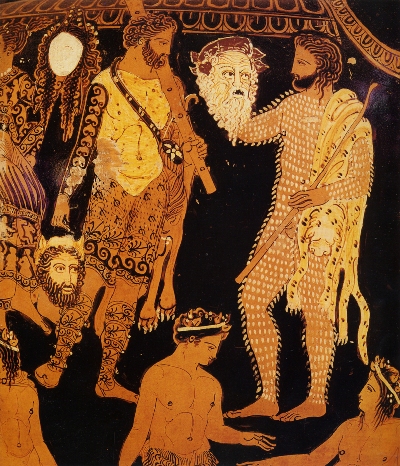Aristotle is known to have attributed the origin of Greek drama to the worship of Dionysus and the singing of Dithyrambic Odes, which admittedly, plays a big part in Greek Tragedy in 5th century Athens. However, the origin of Tragedy actually probably belongs to the worship of dead heroes, like Adrastus. F. B. Jevons points out that Herodotus reports that tragic choruses were preformed over Adrastus’ death. Meanwhile, Jevons also makes the vital point that masks were “never worn in the performances of the dithyrambic chorus” and as he says quite beautifully, “Masks and acting in Greece were inseparable; there was no acting without masks, and there were no masks without acting”. However, for the sake of being thorough, all origins of Greek tragedy, including dithyrambs, will be discussed.
Epic poetry not only provided a basis for the kind of stories tragedy would deal with, it also provided the format for language in which these stories would be told. The iambic form was discovered in the epics of The Illiad and The Odyssey and continued long into Tragedy.
Dithyrambs provide the first link to Dionysus and performance. These were odes sung to honor the god, and can be seen used by a tragic chorus in Euripides’ The Bacchae. The comedic versions of these songs, called “phallic songs” can be called the origins of comedy. Both of these songs were the beginning of the separation of leader from chorus, which is later separated even further.
These forms transformed into the Satyr plays which are often comedic and have masked Satyr chorus. Satyr plays were, of course, continued as an actual form and were present in all Great Dionysia festivals.
Finally, as Aristotle explains “it was only at a late stage that tragedy attained dignity by departing from the style of satyr-plays”. Tragedy and Comedy eventually came into being on their own. Tragedy was “gradually enhanced” as the poets changed it. Aristotle attributes the increase of actors from one to two to Aeschylus and the increase to three, as well as scene painting, to Sophocles. Thespis,where we get our modern word "thespian" introduced the use of masks. Whether or not these elements can actually be attributed to these playwrights is impossible to know, however tragedy did evolve this way and, as Aristotle puts it “when it had gone through many changes, tragedy ceased to evolve, since it had attained its natural fulfillment”. While, this is perhaps an overstatement, there is no doubt that the Greek Tragic plays of the 5th century BC were indeed some of the greatest writing, from one of the greatest civilizations the world has ever seen.

